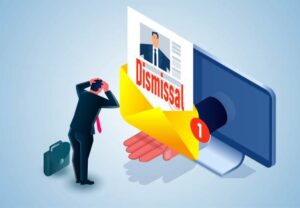
You do not have to agree to a probation period
The probation period is something that all part-time and full-time employees will be familiar with. Usually lasting three to six months long. Sometimes longer depending on the role and circumstances. Air traffic controllers, is 12 months, university lecturers up to three years. It’s a universal requirement when starting a new job in Australia and in most countries across the globe.
Be aware you do not have to agree to it. You can have this trial period set aside in writing as part of your new employment contract. An example of this is you are looking at the prospect of giving up what is already a good job for a career advancement. Or your head hunted. Why would you agree to essentially a trial period to face the prospect of the employer excising their right to dismiss you be saying “look its not just working out”. On the other hand you make not get the job unless you agree to the trial period because the employer doesn’t want to lock themselves in to a stronger contract. It all depends on your negotiating position.
On the surface, the probation period seems to heavily favor the employer to the disadvantage of the employee. However, there are some advantages to the probation period for employees too.
In this article we’ll weigh up the pros and cons of probation periods, and you may be surprised by some of the advantages it provides employees. But first, we’ll explain why a probation period can be disadvantageous for employees.

Probation period disadvantage #1: You can be dismissed with little to no notice
For employers, trial periods are good business practice. Essentially, it acts as an extension of the recruitment process. It allows them to assess if an employee is suited to their role by observing their performance over a period of three to six months. Employers will typically conduct regular performance assessments during this time.
For employees, however, the probation period comes with several disadvantages. One of these is that if an employee fails to live up to expectations, the employer can dismiss them typically with just one week’s notice or with one week’s pay in lieu of notice. The notice period, however, can depend on the employee’s contract, award or registered agreement. Sometimes, they can be dismissed with no notice at all. This is the case when the employee completes their probation period, but the employer decides to dismiss them.
Probation periods therefore require far less notice than is usually required. Once the probation period ends, the employer must typically provide four weeks’ notice or longer, depending on what is stipulated in the employee’s contract. If an employee is dismissed during their probation period, they are however still entitled to receive written notice of their termination and to be paid out any unused annual leave hours
Being dismissed can be very stressful
Being dismissed so suddenly during their probation period can be very distressful for an employee. It means that they are suddenly without a stable income and could potentially spend many months trying to find employment. Adding to their distress and frustration is the fact that, as we will explain below, the employee doesn’t have any power to contest their dismissal.

Surprising fact about probation periods
What many people may not know is that the probation period isn’t a legal requirement. Australia’s workplace relations laws, namely those contained in the Fair Work Act 2009, do not include any mention of probation periods.
The Fair Work Act does, however, specify a minimum employment period to be able to lodge a unfair dismissal claim. Its referred to as a qualifying period. If you are employed by a small business with less than 15 employees, the minimum employment period is 12 months. If 15 or more, it is six months.
It is only after an employee has met the minimum employment period that they are eligible to make an unfair dismissal claim. This leads us to the second big disadvantage of probation periods for employees.
Probation period disadvantage #2: You can’t make an unfair dismissal claim
During the probation period, employers can dismiss an employee without regard for unfair dismissal laws. Unfair dismissal laws ensure that an employee’s dismissal isn’t harsh, unjust or unreasonable. During a probation period, an employee can therefore be dismissed for a reason that may not necessarily, under normal circumstances, seem fair or reasonable. And they can’t contest the decision at the Fair Work Commission.
Employees are, however, still eligible to make a General Protections claim during their probation period. This ensures that, amongst other things, they can’t be dismissed or subject to harmful actions from their employer if those actions are undertaken for an unlawful reason.You can read more about General Protections claims and your rights during a probation period in our article here.

How is the probation period advantageous to employees?
There is a silver lining to probation periods for employees, however. For the very same reasons that they are disadvantageous to some employees, probation periods are also advantageous to many more.
Trial periods provide employers with the ability to dismiss an employee on very short notice, often for a reason that doesn’t have to meet the rigorous criteria of unfair dismissal laws. It therefore costs them far less time, money and effort than is required when dismissing an employee in normal circumstances.
What this means is that employers are given the freedom to recruit employees who may pose some level of risk. Essentially, the probation period allows the employer to take a chance on an employee. An example of this is in France where you cannot dismiss anybody easily regardless of how long they have been employed. This has lead to 45 percent unemployed Muslim youth in some cities, because no one wants to give them a go.

Probation periods provide an opportunity for employees
For example, an employer may be open to recruiting a young candidate who may lack the traditional skills required for a role, but who seemingly makes up for it with enthusiasm and drive. If the employee ends up underperforming during the probation period, the employer can dismiss them far more easily than under normal circumstances. This point can be quite relevant around recruitment for apprenticeships.
The probation period may also make an employer open to recruiting other potentially risky candidates. For example, someone who is injured and due to that injury, may or may not be able to perform the role adequately. Or a female candidate who has been out of the workforce for a long period due to extended maternity leave.
While it may not seem fair or right, such candidates often face trouble re-entering the workforce. The probation period makes it more likely that an employer will take a chance on them.
Other advantages of probation periods
Another advantage of a probation period is that even if the employee fails to perform adequately, the probation period can often be extended. That is, as an alternative to dismissing the employee. An extension can be made by agreement between the employer and employee, of if the employee’s contract, award or registered agreement allows for it.
The short notice required with a probation period can also work in the employee’s favour. If they decide that the job is not for them, they can end their employment quickly and easily.

How do probation periods work overseas?
In the developed world, probation periods are a common requirement for new employees. In New Zealand, they entail far more rigorous requirements for employers than in Australia. New Zealand employers must follow a fair process that involves providing regular feedback and telling the employee if there are any issues related to their work. If there are issues, the employer must provide the employee an opportunity to improve. This can include providing support and training.
Unlike in Australia, when an employee comes to the end of their probation period in New Zealand, the employer can’t simply dismiss them. They must have assessed the employee fairly. And if the employer deems the employee did not perform adequately, they must let the employee know why before dismissing them. The employee must also have the opportunity to respond to any claims of underperformance. If they are dismissed, the employee also has the right to make an unjustified dismissal claim.

Probation periods in the United States
Australian employees may have less rights during a probation period than those in New Zealand. But Australia still compares very favorably to the United States.
While many American employers require new employees to meet a probation period, the nation’s “at-will” employment laws essentially render it moot. In Australia, probation periods make sense because it lessens the amount of notice that must be given when dismissing an employee. Also, the employee is not eligible to make an unfair dismissal claim.
But America’s “at-will” laws enable an employer to dismiss an employee for any reason. That is, without having to establish “just cause” for termination, and without warning. The termination, however, must not be for a reason that’s illegal. For example, due to the employee’s race, religion, sexuality or any other protected attribute. This means that even after passing the probation period, an American employee can still be dismissed without warning or reason.
Conclusion
Have you been mistreated during your probation period?
While employees in their probation period don’t have recourse to make an unfair dismissal claim, they still have rights. If dismissed, your employer must still provide you with written notice of your termination and pay out any unused leave.
You also have the right to make a General Protections claim. If you think you have been dismissed or subjected to actions from your employer that were motivated by unlawful reasons, you could be eligible to make a claim. If you have a concern about your probation period, our friendly team at A Whole New Approach can help you understand your rights. We can also help you understand if you are eligible to make a General Protections claim.
All Fair work matters, including, casual employee issues, forced resignations, sacked at work, employee rights, workplace investigations.
Call us today on 1800 333 666 for a free and confidential conversation.

Articles
Considering lodging a general protections or unfair dismissal claim
Difference between unfair dismissals and general protections






